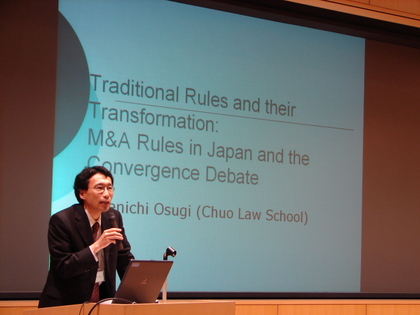Traditional Rules and their Transformation:
M&A Rules in Japan and the Convergence Debate
 "Convergence" can be used to describe various phenomena, even within the narrow context of M&A. If you compare the M&A rules in Japan with those in the US or EU countries, there are many similarities as well as differences. However, focusing on the "M&A system", rather than the individual rules, we can safely conclude that the M&A system in Japan is moving in the direction of Delaware. For example, Japanese law does not prohibit defensive measures by corporate managers and the courts actively police abusive defensive tactics. "Convergence" can be used to describe various phenomena, even within the narrow context of M&A. If you compare the M&A rules in Japan with those in the US or EU countries, there are many similarities as well as differences. However, focusing on the "M&A system", rather than the individual rules, we can safely conclude that the M&A system in Japan is moving in the direction of Delaware. For example, Japanese law does not prohibit defensive measures by corporate managers and the courts actively police abusive defensive tactics.
This article finds that there are two basic elements that have facilitated the convergence of Japan’s M&A system towards the Delaware model. First, the Commercial Code provides clear rules regarding share issuance and the courts have used these rules to prevent cases of unfair share issuances. Second, since the 1993 reform to the Commercial Code, which facilitated launching derivative suits, judges have gained expertise in dealing with cases where the business judgment of corporate managers is in question. Although the importation of the Delaware system in 2005-2006 was only partial and fragmented, the two elements mentioned above have played a key role in integrating indigenous and foreign components into a balanced and consistent system to regulate M&A in Japan.
The Corporate Governance in East Asia 2007 Conference papers were published on the Asian-Pacific Law & Policy Journal, Volume IX, Issue 1.
 Please follow this link for the downloadable (pdf) file of Professor Osugi's paper. Please follow this link for the downloadable (pdf) file of Professor Osugi's paper.
|